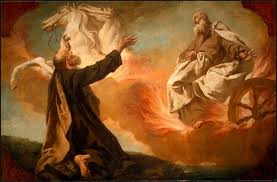Ancient rabbinical writings contain statements about spiritual heroes, such as Moses, who are said to have gone to heaven and either remained there or returned, usually to reveal heavenly secrets or mysteries to earthlings. But Proverbs 30.4 states, “Who has ascended to heaven and come down?” insinuating that the answer is “no one.” Later, Jesus reportedly said, “No one has ascended into heaven except the one who descended from heaven, the Son of Man” (John 3.13), speaking of himself.
 Then, what about Enoch and Elijah? We’ve always been told that they went to heaven. Read the following brief but excellent article about this question, written by Alane Rozelle of Michigan (bold not mine). It appeared in the February, 2017, edition of Focus on the Kingdom–a monthly, theological letter edited by Professor Anthony Buzzard emeritus of Atlanta Bible College:
Then, what about Enoch and Elijah? We’ve always been told that they went to heaven. Read the following brief but excellent article about this question, written by Alane Rozelle of Michigan (bold not mine). It appeared in the February, 2017, edition of Focus on the Kingdom–a monthly, theological letter edited by Professor Anthony Buzzard emeritus of Atlanta Bible College:
“As children in Sunday School class or Vacation Bible School, we are often told the marvelous story of Elijah and Elisha. 2 Kings 2 relates the history of Elisha, the heir-apparent to the ministry of Elijah, following his mentor from Gilgal to the River Jordan, repeatedly refusing to stay behind. Near the end of the long journey, Elisha requested and received a ‘double portion of your spirit’ from Elijah. Then as they continued their walk, ‘there appeared a chariot of fire and horses of fire which separated the two of the, and Elijah went up by a whirlwind to heaven’ (v. 11; cf. 2:1). Typically, we are told the story ended there. We are left to believe that Elijah was taken up into heaven, to where God lives, and he never died.
“In a similar fashion, we also learn of Enoch, a man who ‘walked with God, and he was not, for God took him’ (Gen. 5:25). The Sunday School teachers, the pastors, the translators’ footnotes in our Bible all would have us believe that these two men–Enoch and Elijah–got to go ‘straight to heaven without dying.’ This is taught as a fantastic mystery.
“However, doesn’t this ‘mystery’ flatly contradict the Scriptures which say that ‘the wages of sin is death, but the gift of God is eternal life through Jesus Christ our Lord‘ (Rom. 6:23)? Someone might say, ‘Enoch walked with God, meaning he didn’t sin; therefore God could take him directly to heaven.’ Again, Romans 3:23 clearly states: ‘For all have sinned and fallen short of the glory of God.’ The word ‘All’ must include every man, woman and child, without exception. All have sinned; therefore all must die (unless Jesus returns first). Would it be fair that God would allow these two sinful men–no matter how ‘good’ their lives might have been–to receive immortality without experiencing the wages of their sin?
“Or are we being duped? Hebrew 11 gives us a lengthy list of faithful men and women approved by God (v. 1). The list even includes the story of Enoch: ‘By faith Enoch was taken up, so that he should not see death; and he was not found because God took him up; for he obtained the witness that before his being taken up he was pleasing to God’ (v. 5). That certainly seems to support the notion that Enoch didn’t die. Yet notice verse 13: ‘All these [meaning all the great men and woman of faith who have thus far been mentioned in verses 1-12, including Enoch!] died in faith, without receiving the promises [without receiving the life of the age to come!], but having seen them and having welcomed them from a distance [they saw the promise of the life of the age to come on earth as being in the future yet].’ So according to Hebrews 11:13. Enoch did indeed die. After that, the writer of Hebrews names over a dozen more faithful people who still ‘having gained approval through their faith, did not receive what was promised, because God had provided something better for us, so that apart from us they should not be made perfect’ (vv. 39-40). In other words, nobody was allowed to receive the promises ahead of anybody else. They had to wait for us. We all get to receive the promises involved with the life of the age to come together, at the same time, when Jesus returns to earth.
“We now have acquired some information about Enoch, but what about Elijah? He was not mentioned in the roll of the faithful dead in Hebrews 11. Perhaps he did after all elude death. 2 Kings 2:15-18 recounts that ‘fifty strong men’ fruitlessly searched for Elijah for three days. Surely that is proof? Yet oddly enough we find in 2 Chronicles 21:12 that Jehoram (Joram), king of Judah, received a letter from Elijah ten years (approx. 843 BC) after his supposed ‘translation to heaven (approx. 852 BC). Was the mail service so bad in those days that it took ten years for Elijah’s letter to be delivered? Or did he float it down from heaven? Maybe he had an angel act as postman? Barring such fantastic notions, we must admit that Elijah the prophet was still alive and working ten years after the whirlwind incident.
“In light of this, we ought to rethink what we have been taught. The Scriptures never say that Enoch or Elijah did not die. They say that Enoch was ‘taken up by God so that he should not see death’ (Heb. 11:5) and that Elijah ‘couldn’t be found’ (2 Kings 2:17). Both of those phrases are quite different from saying that someone did not die, or that someone went up to heaven to live with God. We have made a grand assumption based on these phrases. We have assumed that if someone was ‘taken up by God’ then person had to go to heaven and still be there. We have assumed that if a person couldn’t be found, he must still be alive thousands of years later, whereas in fact, Genesis 5:23 gives Enoch’s lifespan: 365 years, and not a day more.
“Could it be that the phrase ‘taken up by God’ or ‘taken up to heaven’ could have a different meaning than that which we have long assumed? In Acts 8:39, we see that after Philip successfully evangelized and baptized the Ethiopian eunuch, the Spirit of the Lord ‘snatched Philip away and the eunuch saw him no more.’ This is very similar to what happened to Enoch and to Elijah, yet we do not assume that Philip was taken up to heaven, never to die, because in the very next verse we are told that Philip ‘found himself at Azotus.’ We don’t make the baseless assumption about Philip because we are told where he ended up. ON the other hand, because we are not told where God dropped Enoch and Elijah, we assume that they are still in heaven. We must make our beliefs align with all of scripture. Since Romans 6:23 and Hebrews 11:13 tell us that all die, no matter how faithful they are, we must believe that Enoch and Elijah also died.
“The more plausible explanation, therefore, for the end of Enoch is that all the others in Enoch’s lineage were buried by their families, but in Enoch’s case, as in Moses’ (Deut. 34:6), God took him and buried him where nobody knows. He ‘was,’ and then he ‘was not.’ He was never seen again by anyone on earth, just as the eunuch never saw Philip again. Enoch died, and so did, eventually, Elijah. Yes, Elijah was caught up into ‘heaven’ by God, but that doesn’t mean he is still there.
“Additionally, we need to examine the meaning of ‘heaven’ as used in Scripture. According to Easton’s Bible Dictionary, the Jews claimed there were three heavens: the firmament where birds fly (Gen. 2:19), the starry heavens (Deut. 17:3), and the heaven of heavens or third heaven (Deut. 10:14). Various words which are rendered ‘heaven’ in some verses can also mean heights, elevations, high places, sky, or clouds. And quite curiously, since we are thinking of Elijah, the Hebrew word galgal, literally, ‘wheel,’ is translated as ‘heaven’ in Psalm 77:18, or ‘whirlwind’ in the RSV! We cannot know how high or into which ‘heaven’ Elijah may have been taken. We can know for certain, however, that he did not remain there. He was heard from again on earth ten years after being caught up, and because Jesus did not establish his Kingdom on the earth during Elijah’s lifetime, we can also be sure that Elijah died (Heb. 11:32 says that the prophets died), just as everyone before and after him sleeps the sleep of death (Ps. 13:3) He sleeps ‘with the fahters,’ in the grave, awaiting the second coming of Jesus, when the dead in Christ shall rise first. As Hebrew 11:39-40 assures us, the faithful will be made perfect together with us. What a marvelous plan!”













